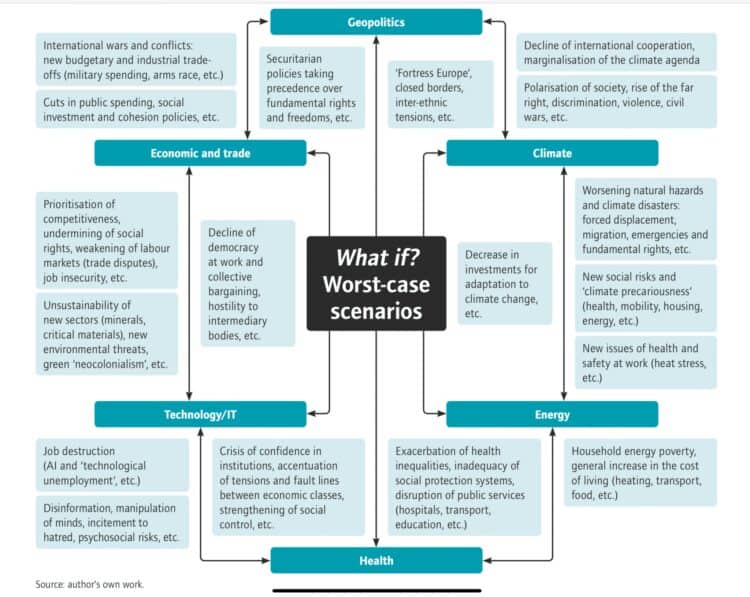Two significant events marked the beginning of November 2024, both of which may foreshadow what lies ahead for Europe in the coming years and decades. Firstly, a climatic catastrophe struck the Spanish city of Valencia, and secondly, Donald Trump secured victory in the US presidential elections.
While these events are distinct from one another, they underscore the uncertainties and, more importantly, the vulnerabilities of the European Union to both its internal and external environments. A recent study by the European Trade Union Institute examines these vulnerabilities and identifies six key areas of concern: geopolitical (the war in Ukraine, European defence and security), economic (protectionism in the United States, increasing trade conflicts with China), climatic (extreme events, delays in the industrial transition, etc.), energy (price fluctuations and security of supply), technological (dependence on critical technologies and materials), and health (the risk of new pandemics and shortages of medicines).
Each of these six areas presents its own unique threats. For instance, the EU’s chief diplomat, Josep Borrell, has referred to the ‘weaponisation’ of migration. Europe must now venture beyond its comfort zone. Over the past few years, the EU has been attempting to develop what could be called a ‘security agenda’. This agenda remains relatively fragmented and includes an economic security strategy, support for the military industry, an emergency instrument for the single market in the event of extreme events, a body to prepare for health threats, and stricter migration policies. This focus on ‘securing Europe’ is reflected in the composition of the new European Commission von der Leyen II (2024-2029). Key responsibilities include ‘technological sovereignty’ and ‘security and democracy’ for Commissioner Henna Virkkunen, ‘preparedness’ for Roxana Mînzatu, ‘industrial strategy’ for Stéphane Séjourné, ‘economic security’ for Maroš Šefčovič, ‘defence’ for Andrius Kubilius, ‘migration’ for Magnus Brunner, and ‘crisis management’ for Hadja Lahbib. It is notable that only the latter role existed in the previous Commission, highlighting a shift in context.
What implications might this changing environment — particularly one that is becoming increasingly hostile — have for the European social agenda, the climate transition, and the roles and strategies of social stakeholders? If these threats become reality — such as wars on the European continent, exacerbated climate disasters, new pandemics, and the rise of ‘AI extremism’ — what new issues and challenges will arise, and how will progressives respond? This is the question the ETUI publication aims to address. The emerging challenges could include the risk of transforming the objective of security into a security-driven Europe, prioritising it over fundamental rights. There is also the proliferation of new ‘socio-climatic’ risks, including forced displacement, housing shortages, health crises, and mobility issues. Additionally, energy poverty, the weakening of labour markets, rising inequalities, polarisation, and social unrest are pressing concerns.
Furthermore, the rise of the far right, the decline of international cooperation, and the closing of borders add to the social issues and challenges in these worst-case scenarios. How can we prepare for these developments? Currently, the priorities articulated by the EU’s heads of state and government centre on competitiveness and a return to fiscal discipline, if not austerity. If we also consider the more or less hidden agenda of enhancing European security, what space will remain for a just transition and social investment? This is not a theoretical question; it is one that Valencia currently poses. Security is a legitimate concern which serves as one of the primary missions of public authorities. In the more hostile environments that lie ahead, the major strategic challenge for social actors will be to demonstrate that security is also social.

Christophe Degryse is head of the Foresight Unit at the European Trade Union Institute.

